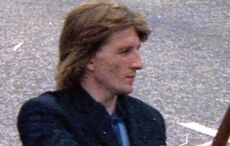Diagnosis of a fatal disease is beyond heart-breaking. It is the moment when your life is irrevocably changed, when all past worries and fears are suddenly overtaken by this new, incomprehensible future. What can only make such a diagnosis worse is when it happens to a child. It is every parent’s worst nightmare, being faced with the prospect of outliving your child. It was this nightmare diagnosis that Paula and Padraic Naughton faced in November 2012, when not only one, but all three of their sons were diagnosed with Duchenne Muscular Dystrophy, a degenerative genetic disease with an average life expectancy of 25.
Before the diagnosis on November 9, 2012 Paula and Padraic held the same hopes and dreams for their boys as any parents do: a happy and healthy life. Both Naughton parents are experienced nurses and have seen families deal with any number of illnesses down through the years. That didn’t make their discovery any easier to deal with.
Although eldest son Archie had trouble walking, they believed this was the result of a case of meningitis he suffered through as a young child. It wasn’t until one of the twins, Isaac, started suffering from the same mobility issues that alarm bells started to ring. It was shortly after this that the Naughton family received the earth-shattering diagnosis of Duchenne Muscular Dystrophy (DMD).
In an interview with IrishCentral, Paula struggled to find the words to articulate her feelings: “There is no comparison, there are no words…on that day our lives were shattered, our hearts beyond broken. We won’t ever recover from this; we just have to fight on.”
Duchenne Muscular Dystrophy is a neuromuscular disease that destroys muscle tissue through a mutation on an X-chromosome gene, which stops the protein dystrophin from being properly produced. Without this protein muscle development cannot take place properly and sufferers begin to exhibit signs of muscle weakness and disintegration in early childhood.
Most children affected are wheelchair bound by 12 and the illness eventually leads to paralysis and ultimately death. This stark reality faces many families, with one in 3,500 boys being diagnosed with DMD and over 20,000 born in the developed world every year.
Paula Naughton wearily lists off the facts about the disease to us, statistics that shock and horrify: “over 100 families in Ireland are living with DMD, in the United Kingdom over 100 DMD sufferers are born annually and on average two boys die of it a week and that globally it is estimated that there are an unbelievable 200,000 DMD sufferers.” 99% of DMD victims are male, with a much smaller number of girls diagnosed each year.
It is the most common lethal genetic disorder identified in young children, yet there is a surprising lack of knowledge about DMD. It does not have the same level of awareness in Ireland or elsewhere that many other fatal illnesses have, and even the Naughtons, despite their medical backgrounds, were confounded when faced with the diagnosis. The disease is carried on the mother’s X-gene, but for Paula, there was no history of DMD in her family; shockingly in up to 35% of cases of DMD there is no family history. It can strike any family, regardless of history or health.
Women can now be tested for the defective gene either prior to or during pregnancy. As is the case with screening in utero for Down syndrome and cystic fibrosis, there are a number of complex moral debates surrounding genetic testing.
The most harrowing thing about Duchenne is that, at present, there is no cure and no treatment. Paula describes a constant sense of “helplessness” that threatens to overcome them, which they have to push down daily.
When faced with the diagnosis, Padraic and Paula chose to fight back by setting up a trust entitled Join Our Boys. The mission of the trust is two-pronged: to raise awareness of and funds for research into DMD, and to provide the Naughton boys with the resources necessary to keep them healthy and mobile for as long as possible.
Paula is well aware of recent scandals in the Irish nonprofit and charity sector such as the Rehab mess, so extra care has been taken to ensure that Join Our Boys is a model organization, with independent trustees and full accountability. To date Join Our Boys has received overwhelming support from the Naughtons' community in Roscommon, managing to raise over €600,000 since the trust was launched in March 2014. There are regular fundraisers and events run across the county to aid the Naughtons and DMD research, all run on a volunteer basis.
The community project is aiming to build a purpose built house for the Naughton family to use for as long as is required; the house will belong to the Trust not the family. The other main aim of the Trust is raising money for Clinical Research trials with the ultimate goal of finding a treatment, ideally a cure, for all the children with DMD.
During the interview, Paula went to lengths to express her eternal gratitude to the people of her community who have been so remarkably selfless, but she knows that to take the Join Our Boys trust to the next level they must begin to look further afield – to larger places in Ireland like Dublin and Galway, as well as to the United Kingdom and America.
DMD is a global problem, affecting children all over the world. For Join Our Boys, this means they want to see a global response. The next step for the Naughtons and Join Our Boys is an international conference to be held in Croke Park in the summer of 2015. It will bring together researchers and speakers on DMD from around Europe to discuss research and treatment.
A European Union research consortium for DMD is pursuing an EU research grant, which would give a much needed boost to the awareness of Duchenne globally, helping to drive clinical research trials which could begin as early as 2016. But, as Paula is all too aware of, it is only early days in clinical research trials and it is her family that must live with the daily struggle of DMD.
Despite the seemingly insurmountable odds, Paula still holds on to hope for a breakthrough. Until that miracle arrives, Paula and Padraic, along with the entire Join Our Boys trust, will continue to raise awareness of DMD, to fund-raise for research and for the palliative care home and care for Archie, Isaac and George as they live with Duchenne Muscular Dystrophy.
“One thing has come from the unimaginable horror of all this is that you really do see the best of humanity and people are very good and kind and a lot of the time people are like us, they can’t speak, they don’t know what to say. And that’s one of our taglines we say, ‘no treatment, no cure, no words’ because really, there are none. It has made me appreciate every moment with my boys, to take nothing for granted… We will continue to do our best for our boys and the trust, and we will continue to fight this; presented with this unbelievable situation what parent wouldn’t do the same?”
If you would like to learn more about Join Our Boys or if you think you can help, you can visit the website at www.JoinOurBoys.org or visit the Facebook page.




Comments